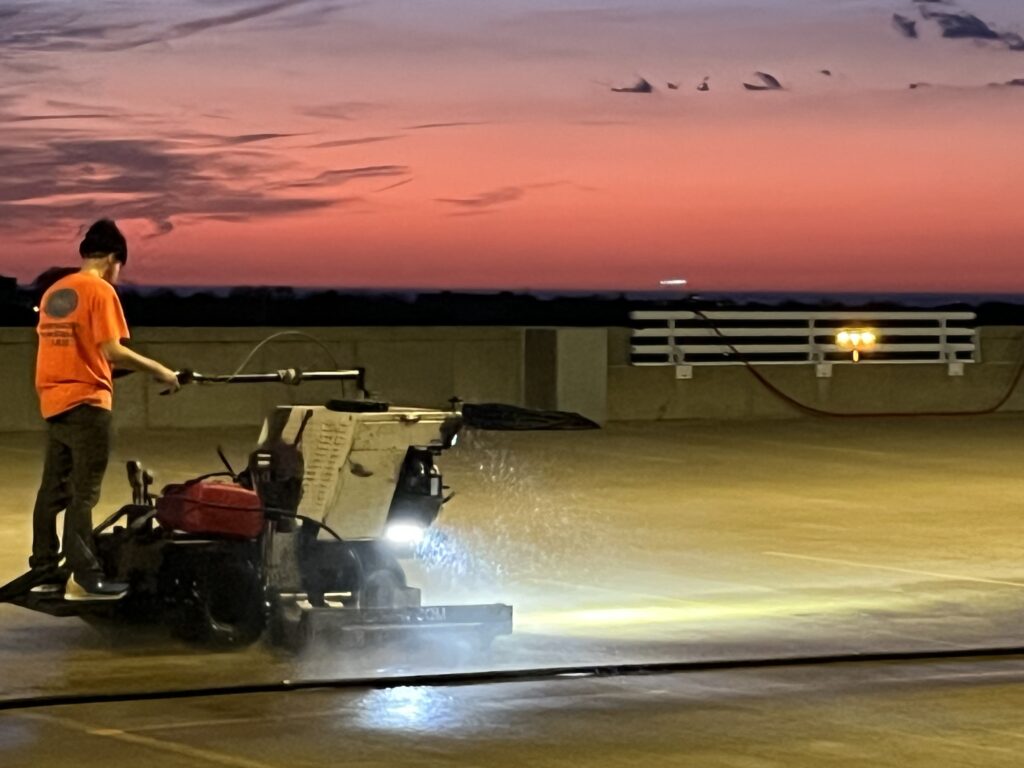
Parking garages are integral to urban infrastructure, providing essential spaces for vehicle parking in bustling metropolitan areas. However, these structures face unique challenges that can compromise their integrity and safety over time. One of the most effective maintenance strategies for preserving parking garages is pressure washing. This article delves into the significance of parking garage pressure washing, discussing its benefits, the impact of neglect, and manufacturers’ recommendations for best practices.
Understanding the Need for Pressure Washing
1. Maintenance of Aesthetic Appeal
A clean parking garage enhances the overall aesthetic appeal of a property. Accumulation of dirt, oil, and other contaminants can create a negative impression for visitors and tenants alike. Pressure washing removes unsightly stains and debris, contributing to a more inviting atmosphere.
According to the International Parking & Mobility Institute (IPMI), a clean environment fosters a sense of safety and well-being among users, leading to higher satisfaction rates and increased usage of the facility.
2. Prevention of Slip and Fall Accidents
Safety is a primary concern in any parking structure. Accumulated grime and contaminants can create slippery surfaces, posing a risk of accidents. Regular pressure washing effectively removes these hazards, reducing the potential for slips and falls.
The Occupational Safety and Health Administration (OSHA) emphasizes the importance of maintaining clean and safe environments to prevent workplace injuries. This principle extends to parking garages, where both pedestrians and drivers are at risk.
3. Protection Against Structural Damage
Parking garages are often exposed to various environmental elements, including rain, snow, and ice. These factors contribute to the degradation of concrete surfaces, leading to issues such as:
- Spalling: This occurs when water seeps into concrete, freezes, and expands, causing the surface to flake off.
- Corrosion of Reinforcing Steel: Moisture and contaminants can accelerate the corrosion of embedded steel, compromising structural integrity.
- Alkali-Silica Reaction (ASR): A chemical reaction between alkalis in cement and silica in aggregates can cause concrete expansion and cracking.
Regular pressure washing helps remove contaminants that contribute to these issues, extending the lifespan of the parking garage.
4. Enhancing Drainage Efficiency
Effective drainage is crucial for maintaining a parking garage’s structural integrity. Clogged drains can lead to water accumulation, causing damage to the concrete and promoting mold and mildew growth. Pressure washing clears debris from drainage systems, ensuring efficient water flow and preventing costly repairs.
5. Compliance with Regulations
Many municipalities have regulations regarding the maintenance of public and private parking facilities. Regular cleaning, including pressure washing, helps property owners stay compliant with these requirements.
The American Public Works Association (APWA) outlines the need for routine maintenance in public facilities to uphold safety and functionality. Failure to comply with local regulations can lead to fines and additional liabilities.
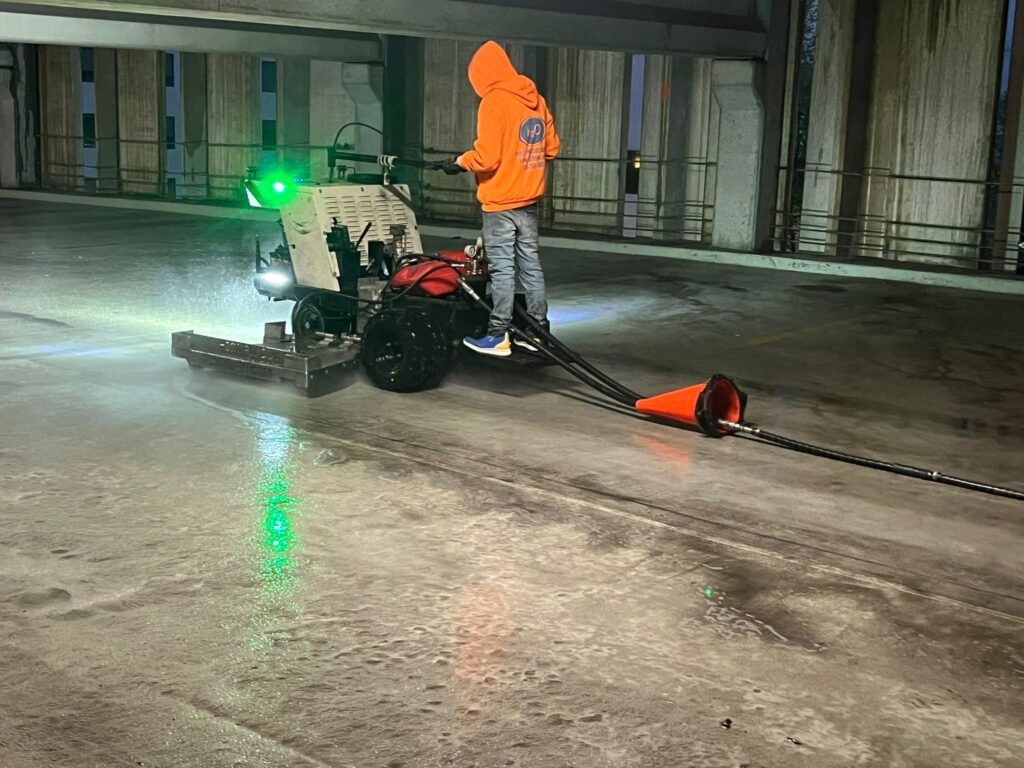
Best Practices for Pressure Washing Parking Garages
1. Frequency of Pressure Washing
The frequency of pressure washing depends on several factors, including the garage’s location, usage, and exposure to environmental elements.
- High Traffic Areas: Garages with heavy daily traffic may require pressure washing every three to six months to maintain cleanliness and safety.
- Low Traffic Areas: Less frequently used garages might only need annual washing.
2. Choosing the Right Equipment
Utilizing the correct pressure washing equipment is crucial for effective cleaning without damaging surfaces.
- Pressure Washers: A commercial-grade pressure washer with adjustable PSI (pounds per square inch) settings is recommended. For most concrete surfaces, a PSI between 2,500 and 3,000 is sufficient.
- Surface Cleaners: These attachments help cover larger areas more efficiently, providing even cleaning without streaks.
3. Selecting Appropriate Cleaning Solutions
While water pressure alone can remove many contaminants, certain cleaning solutions can enhance effectiveness, especially for oil stains and stubborn grime.
- Biodegradable Detergents: These are environmentally friendly and effective at breaking down grease and oil. The Environmental Protection Agency (EPA) recommends using products that are safe for both users and the environment.
- Acidic Solutions: For heavy staining, a diluted acidic solution can help restore the concrete’s appearance. However, caution is necessary to avoid damaging the surface.
4. Conducting Pre-Cleaning Inspections
Before pressure washing, a thorough inspection of the garage should be conducted. This includes:
- Assessing Structural Integrity: Check for cracks, spalling, or other signs of damage that may require repairs before washing.
- Identifying Hazardous Materials: Look for areas with oil spills or other hazardous materials that may need special handling.
5. Post-Cleaning Inspections
After pressure washing, a follow-up inspection is essential to ensure that the cleaning process did not inadvertently cause damage and that all areas have been adequately cleaned.
- Check for Remaining Stains: Inspect for any areas that may need additional attention.
- Evaluate Drainage Systems: Ensure that all drainage systems are functioning correctly and free of debris.
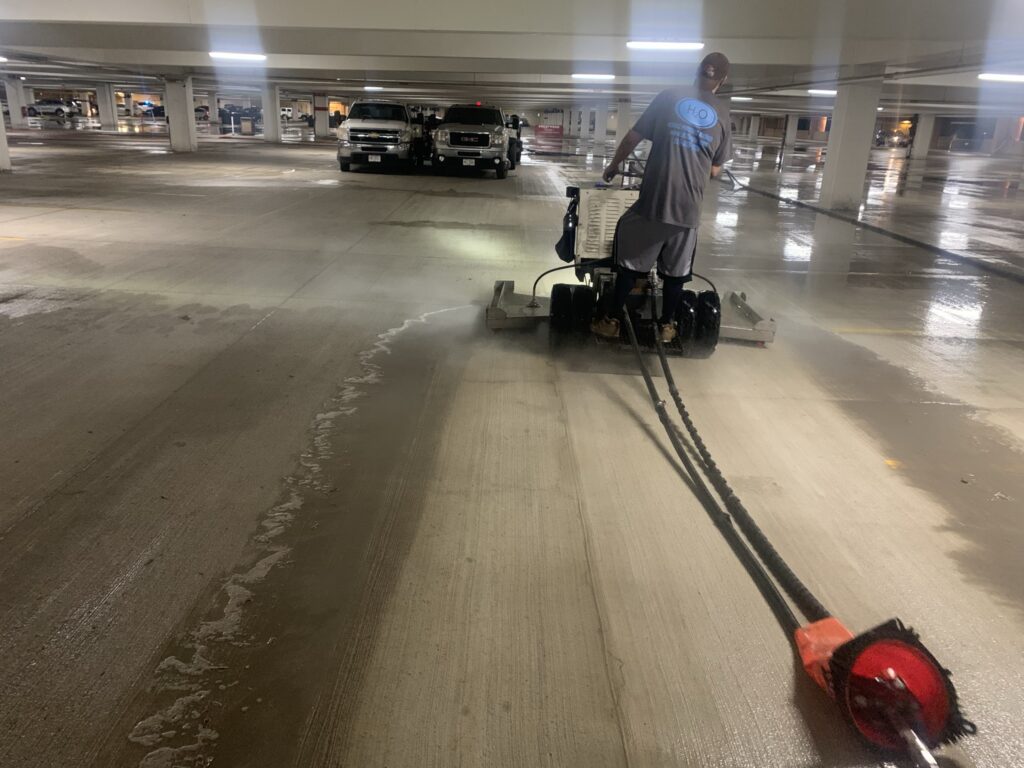
Manufacturers’ Recommendations
Many pressure washing equipment manufacturers provide guidelines for effective cleaning practices specific to parking garages. Here are some notable recommendations:
1. Karcher
Karcher, a leading manufacturer of pressure washers, recommends:
- Use of Rotary Surface Cleaners: These attachments offer efficient cleaning for large concrete areas while minimizing the risk of surface damage.
- Adjustable Pressure Settings: Using the appropriate pressure settings based on surface conditions prevents potential damage.
2. Simpson Cleaning
Simpson Cleaning emphasizes the importance of:
- Routine Maintenance of Equipment: Regular maintenance of pressure washing equipment ensures optimal performance and extends the lifespan of the machinery.
- Training for Operators: Providing proper training for personnel on safe and effective pressure washing techniques minimizes risks during operation.
3. Bosch
Bosch highlights the benefits of:
- Using Eco-Friendly Detergents: Opting for environmentally safe cleaning agents is beneficial for both the users and the environment, aligning with sustainability efforts.
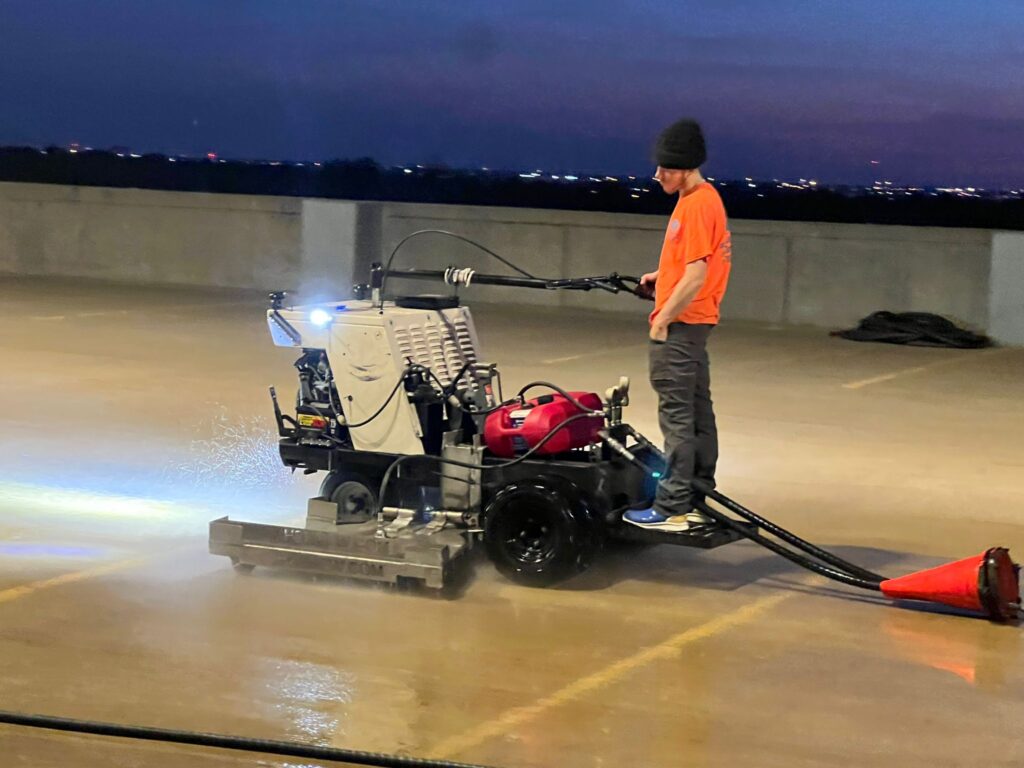
The Consequences of Neglect
Neglecting to pressure wash parking garages can lead to a multitude of issues that compound over time.
1. Increased Repair Costs
Failing to maintain a clean environment can lead to significant structural damage, requiring extensive and costly repairs. According to the National Parking Association (NPA), proactive maintenance, including pressure washing, is far more cost-effective than addressing damage after it occurs.
2. Reduced Property Value
A poorly maintained parking garage can detract from the overall value of a property. Prospective tenants or buyers may view a dirty garage as a reflection of neglect and may be less likely to invest in the property.
3. Legal Liabilities
Increased risks of slip and fall accidents due to neglected surfaces can lead to legal liabilities for property owners. Regular pressure washing mitigates these risks, ensuring a safer environment for users.
4. Deterioration of Reputation
For businesses that rely on parking facilities, a dirty garage can tarnish their reputation. Customers may choose not to return if they perceive the facility as unsafe or poorly maintained.
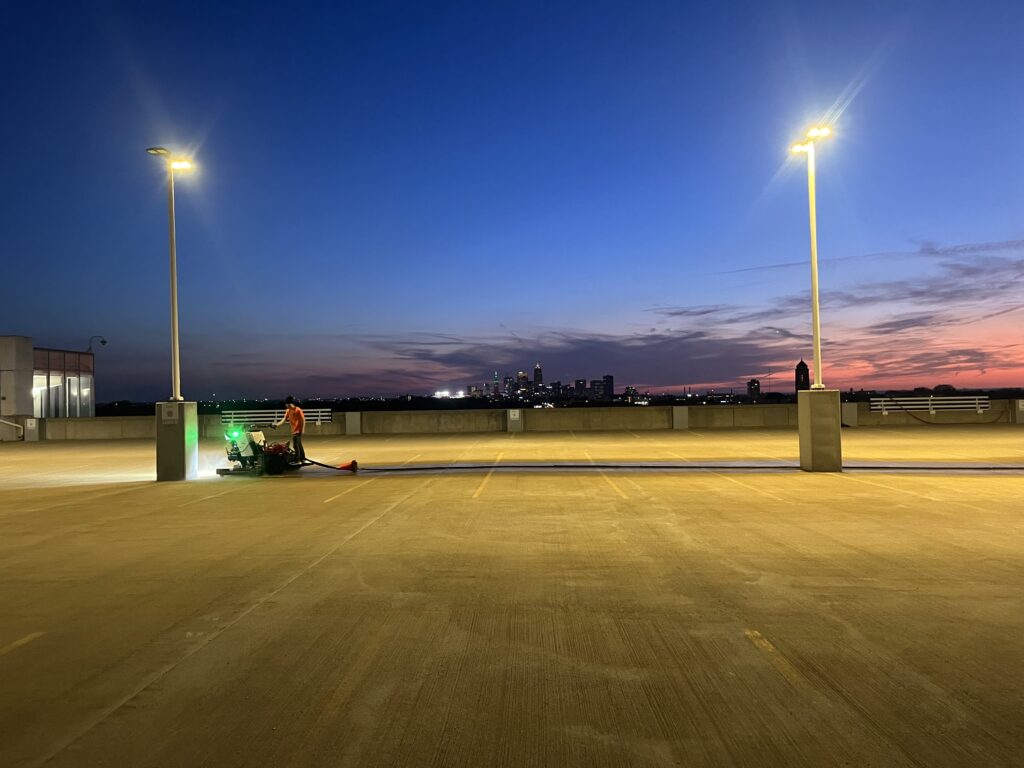
Conclusion
Parking garage pressure washing is not merely a cosmetic necessity; it is a critical component of property maintenance that protects investments, enhances safety, and complies with regulatory standards. By understanding the importance of regular cleaning and implementing best practices, property owners can significantly extend the lifespan of their garages while promoting a safe and welcoming environment for users.
Utilizing proper equipment, following manufacturers’ recommendations, and committing to routine inspections and maintenance will ensure that parking garages remain functional and appealing. As urban areas continue to grow, the need for clean, safe, and well-maintained parking facilities will only increase, making pressure washing an indispensable part of parking garage management.
The Detrimental Effects of Salt Damage
Salt, primarily sodium chloride, is used extensively on roadways to improve traction and prevent ice formation. While effective for vehicle safety, this substance poses significant risks to concrete surfaces in parking garages. Over time, salt can lead to several forms of damage, including:
- Spalling: Salt attracts moisture, which can penetrate concrete. When the temperature drops, this moisture freezes and expands, causing the concrete surface to flake or spall.
- Corrosion of Reinforcing Steel: The presence of salt accelerates the corrosion process of embedded steel rebar. This compromises the structural integrity of the garage and can lead to costly repairs.
- Alkali-Silica Reaction (ASR): Salt can exacerbate the effects of ASR, a chemical reaction between alkali in cement and silica in aggregates, leading to further deterioration of concrete.
The Role of Pressure Washing in Preventing Salt Damage
Pressure washing is an effective maintenance method that can significantly mitigate the adverse effects of salt on parking garage surfaces. The process involves using high-pressure water jets to remove contaminants, including:
- Salt Residue: Regular pressure washing helps to eliminate salt build-up, reducing its potential to attract moisture and penetrate the concrete.
- Grime and Oil: Removing dirt, oil, and other debris enhances the overall appearance of the garage and prevents the growth of mold and mildew, which can hold moisture against concrete surfaces.
- Prevention of Slip Hazards: Clean surfaces minimize the risk of accidents, making garages safer for users.
Best Practices for Preventing Salt Damage
To effectively prevent salt damage in parking garages, manufacturers and industry experts recommend the following best practices:
- Regular Pressure Washing: Schedule routine pressure washing at least twice a year, with increased frequency in regions that experience heavy snow and ice. This is particularly important after winter, to remove residual salt and prevent moisture accumulation.
- Sealant Application: Applying a high-quality concrete sealer can create a protective barrier against moisture and salt infiltration. Experts recommend using sealants that are specifically designed for parking structures, as they can withstand the stresses of vehicular traffic and environmental exposure.
- Proper Drainage Systems: Ensure that parking garages are equipped with effective drainage systems. This helps to direct water away from the concrete surfaces, reducing the chances of moisture accumulation and subsequent salt damage.
- Use of Alternative De-icing Agents: Consider using alternatives to traditional road salt, such as calcium magnesium acetate (CMA) or potassium acetate, which are less harmful to concrete.
- Routine Inspections: Conduct regular inspections to identify and address any signs of salt damage early. Early intervention can prevent more extensive and costly repairs in the future.
References
- International Parking & Mobility Institute (IPMI). “Parking Garage Maintenance Best Practices.” IPMI
- Occupational Safety and Health Administration (OSHA). “Walking-Working Surfaces.” OSHA
- American Public Works Association (APWA). “Best Practices for Parking Facility Maintenance.” APWA
- National Parking Association (NPA). “Maintaining Your Parking Facility.” NPA
- Environmental Protection Agency (EPA). “Cleaning Products: The Impact on the Environment.” EPA
- Karcher. “Pressure Washer Maintenance Tips.” Karcher
- Simpson Cleaning. “Operator Training for Pressure Washing.” Simpson Cleaning
- Bosch. “Eco-Friendly Pressure Washing Solutions.” Bosch
By investing in regular pressure washing, property owners can protect their investments, enhance safety, and contribute to the overall well-being of their community.
